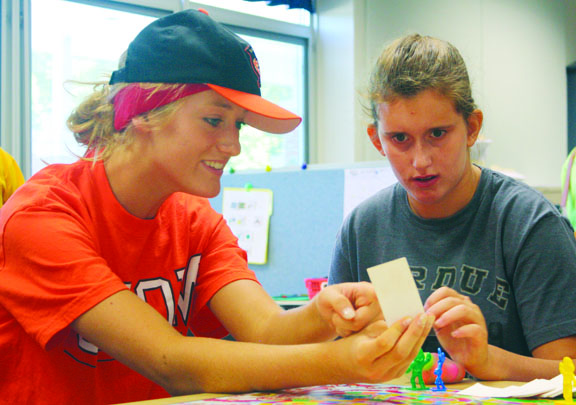To say that senior Sarah Bennett is busy is an understatement. She enrolls herself in the most challenging courses this school offers and crams her schedule with extracurricular activities, including GKOM, NHS, track and cross-country. On a typical day, Bennett stays at school past the 3:05 p.m. bell for athletic practices and works on homework around four hours per night. Despite her hectic schedule, Bennett remains a strong student and has become one of the best runners in Indiana.
“You’re told from the time you’re in sixth grade that you need to go to college,” Bennett said. “Colleges put pressure on students to do well so that they will be admitted into the school, but for me I put all the pressure to do well on myself so I can hope to someday go to a great college.”
Bennett is not the only one who feels the pressure to succeed. A documentary released in Sept. 2010 titled “Race to Nowhere” contends that America’s preoccupation with testing and performance is negatively affecting students and their learning in the classroom, creating a demographic of teenagers who feel overwhelmed by the pressure to excel at all costs.

In an age where college acceptance rates are decreasing, many students seem to extend themselves too far in their academics and outside activities in order to build up their résumé and gain an edge over other applicants. But this mind set can have negative effects, including sleep deprivation and disengagement in the classroom.
Counselor Maria Cottone said she has witnessed this mind set firsthand.
“Sadly, I’ve occasionally seen students burn out before they even get to college,” Cottone said via email. “Students should prepare for college by adding rigor to their high school coursework. Colleges want to see that upward trend in grades as an indication that students are becoming increasingly capable of challenging themselves and will ‘peak’ in college.”
To avoid becoming too overwhelmed, Cottone said students need to remember that they need ample sleep and good nutrition and advises that they build in time for friends, family and hobbies.
“It’s important for students to learn to strike a balance now, since that tends to be a lifelong battle,” Cottone said.
While Bennett maintains a busy lifestyle, she said she has learned to balance academics and extracurricular activities with her social life, as Cottone suggests. According to Bennett, school is not stressful because of the 10-minute passing periods to talk with friends; however, the workload outside of school, when paired with her after school activities, can be stressful.
Like Bennett, senior Michelle Xie takes difficult classes, spends the same amount of time doing homework and stays busy outside of class with extracurricular activities.
Both girls said they feel that the pressure to do well comes primarily from themselves and not from an external source. According to Cottone, this is not uncommon.
“Some students get pressured by parents or family members. Some self-inflict stress and pressure to outperform or match their peers’ accomplishments,” Cottone said. “Colleges are looking at the ‘whole person;’ not just GPA and test scores, but extracurricular accomplishments, volunteerism, leadership and consistent involvement over the course of high school. So the pressure to succeed is not limited to academics.”
As for the documentary’s message that the pressure to perform has undermined actual learning, Cottone said that when students become too focused on learning only what will be on a test in order to earn top grades, they lose the advantage of rich discussion and applying themselves, which limits students. She said the best learning is through in-depth classroom discussion that requires critical thinking and expanding on concepts.
Bennett and Xie disagreed with the documentary’s message that Americans are obsessed with testing and performance, but they acknowledge that pressure to succeed and excel does exist.
“I feel like the stress is normally just compounded in a few weeks during a school year,” Xie said via email. “For me, end of the grading period, finals and AP testing weeks are the only ones (that are) truly stressful. Most of the time, I can get a handle on my schoolwork.”
To combat this type of stress and pressure, Cottone advises students to challenge themselves with rigorous classes, but to stay within reason.
“Students need to find a balance in their coursework with tougher courses in their areas of strength and electives that interest them and may lead them to future college choices,” Cottone said. “Involvement in cl
ubs and athletics are important in developing leadership and staying involved in the community.
“But again, it is critical to have some downtime. Family, friends, personal interests and ‘unscheduled’ time all help to maintain a solid foundation of good emotional health and the energy and motivation to tackle all the goals you have set for yourself. Be your own person; you are unique and that is what will make you a success.”

































![AI in films like "The Brutalist" is convenient, but shouldn’t take priority [opinion]](https://hilite.org/wp-content/uploads/2025/02/catherine-cover-1200x471.jpg)









































![Review: “The Immortal Soul Salvage Yard:” A criminally underrated poetry collection [MUSE]](https://hilite.org/wp-content/uploads/2025/03/71cju6TvqmL._AC_UF10001000_QL80_.jpg)
![Review: "Dog Man" is Unapologetically Chaotic [MUSE]](https://hilite.org/wp-content/uploads/2025/03/dogman-1200x700.jpg)
![Review: "Ne Zha 2": The WeChat family reunion I didn’t know I needed [MUSE]](https://hilite.org/wp-content/uploads/2025/03/unnamed-4.png)
![Review in Print: Maripaz Villar brings a delightfully unique style to the world of WEBTOON [MUSE]](https://hilite.org/wp-content/uploads/2023/12/maripazcover-1200x960.jpg)
![Review: “The Sword of Kaigen” is a masterpiece [MUSE]](https://hilite.org/wp-content/uploads/2023/11/Screenshot-2023-11-26-201051.png)
![Review: Gateron Oil Kings, great linear switches, okay price [MUSE]](https://hilite.org/wp-content/uploads/2023/11/Screenshot-2023-11-26-200553.png)
![Review: “A Haunting in Venice” is a significant improvement from other Agatha Christie adaptations [MUSE]](https://hilite.org/wp-content/uploads/2023/11/e7ee2938a6d422669771bce6d8088521.jpg)
![Review: A Thanksgiving story from elementary school, still just as interesting [MUSE]](https://hilite.org/wp-content/uploads/2023/11/Screenshot-2023-11-26-195514-987x1200.png)
![Review: "When I Fly Towards You", cute, uplifting youth drama [MUSE]](https://hilite.org/wp-content/uploads/2023/09/When-I-Fly-Towards-You-Chinese-drama.png)
![Postcards from Muse: Hawaii Travel Diary [MUSE]](https://hilite.org/wp-content/uploads/2023/09/My-project-1-1200x1200.jpg)
![Review: "Ladybug & Cat Noir: The Movie," departure from original show [MUSE]](https://hilite.org/wp-content/uploads/2023/09/Ladybug__Cat_Noir_-_The_Movie_poster.jpg)
![Review in Print: "Hidden Love" is the cute, uplifting drama everyone needs [MUSE]](https://hilite.org/wp-content/uploads/2023/09/hiddenlovecover-e1693597208225-1030x1200.png)
![Review in Print: "Heartstopper" is the heartwarming queer romance we all need [MUSE]](https://hilite.org/wp-content/uploads/2023/08/museheartstoppercover-1200x654.png)




